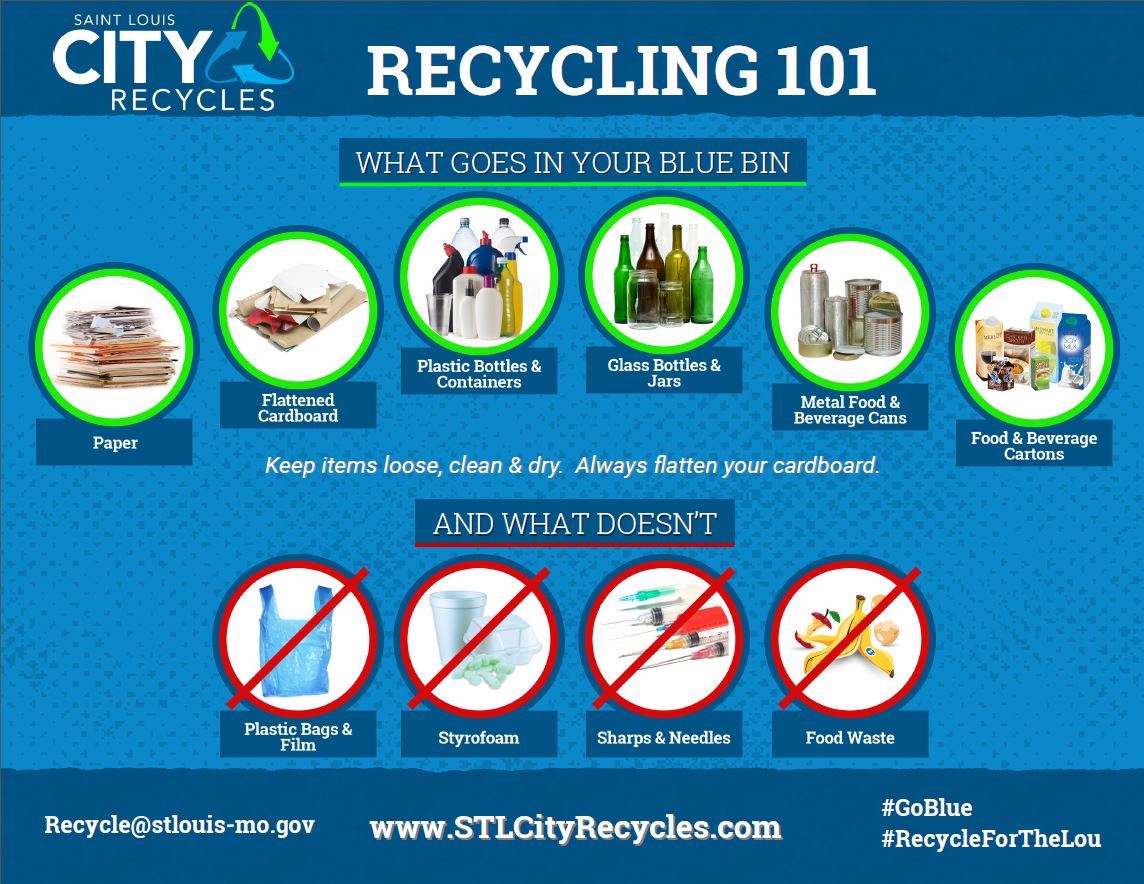Frequently Asked Questions about Recycling
What can I put in my curbside recycling bin?
Stick with the 6: ONLY the six types of items below, generally related to food storage, are what goes in your curbside bin (items must be empty, clean, and dry).
- food and beverage cartons (like juice boxes or any milk cartons)
- glass bottles and jars
- aluminum and metal cans
- rigid plastic bottles and containers (NO flimsy plastic like chip bags or plastic film)
- mixed paper
- flattened cardboard
You can also separate glass to drop off at a Ripple Glass dumpster.
Both St. Louis City and County have Recycle Coach, a mobile app and web widget that makes recycling easier, tailored to area residents! Search any image or word to see where an item goes.
For St. Louis City Residents:
- Download the City Recycle Coach mobile app
- Use the City Recycle Coach web widget
- Roll carts are being picked up; alley dumpsters are not. St. Louis City recycling drop-off locations
- Visit the St. Louis City Recycles website for more information and other waste disposal resources in the City. We follow these recycling guidelines at all of our events.
For St. Louis County Residents:
- Download the County Recycle Coach mobile app
- Use the County Recycle Coach web widget
- Visit the St. Louis County Waste and Recycling page for more information and other waste disposal resources in the County, including e-waste events.
What can I NOT put in my curbside recycling bin?
- NO plastic bags ever, even if full of recyclables
- No flimsy plastic like chip bags or plastic film
- No flat plastic like lids
- No Styrofoam
- No wood
- No electronics, , no straws to no plastic utensils, no paper plates to no paper cups, no flat plastic like lids
- No paper cups or coated paper plates
- No clothing
- No garden hoses
- No plastic utensils or straws
- No zip ties
- No food waste
A lot of materials can technically be recycled, but not everything goes in the curbside single-stream recycling containers. Visit the St. Louis City Recycles website to see what items should go where.
Visit the St. Louis County Waste and Recycling page to see how to dispose of all kinds of household materials properly, including e-waste and household hazardous waste.
For St. Louis City Residents:
For St. Louis County Residents:
Why can't I put plastic bags in my residential single stream recycling?
Plastic bags get wrapped around the gears of the sorting equipment in the recycling facility, making them less efficient. The facility then has to shut down and have someone climb up to cut the bags away from the equipment.
The best thing for plastic bags is to save them separately, then take them to your local grocery store recycling drop off. These include any stretchy film that is clean and dry, such as bread bags, zip lock bags, produce bags, bubble wrap, etc. These do NOT include frozen food bags or saran wrap (cling wrap).
(The best thing is to say NO to the plastic bag!)
If you put a plastic bag full of recyclables in a recycling roll cart or dumpster, it will be thrown away. The sorting facility is very fast-paced and they don’t have time to see if a bag is full of recyclable materials or just trash.
Please empty the bag into the roll cart or dumpster, and save the bag to use again or recycle it at a store collection.
What do I do with electronics?
Most electronics can be recycled through local programs. Check out MRC’s website for Community Electronics Recycling Events around the region, EPC’s website for drop off availability, as well as our Green Community Calendar for other e-waste events.
What do I do with hard to recycle materials such as metals, garden tools, & plastic bags?
A lot of waste can actually be recycled through other programs. Visit the St. Louis Region – Recycling Resources Map to find collectors of hard to recycle materials.
What do I do with used cooking oil (like from the holiday turkey fryer)?
Used cooking oil can be taken to one of our local Household Hazardous Waste facilities. Click here for more info
What do I do with hazardous materials like latex paint, batteries, aerosol cans, & compact fluorescent bulbs?
You can take most hazardous waste to a Saint Louis Household Hazardous Waste drop-off site, which has free residential drop-off for the first 50 lbs. (except latex paint for .50/lb.). See what they accept here. This website also offers alternative disposal sites.
Online resources to learn about recycling and composting
St. Louis Region – Recycling Resources Map: click here
Local St. Louis, MO Channel Nine “What Do I Do With This?” series: https://www.ninenet.org/blogs/science/recycling-living-st-louis/
Local St. Louis, MO Channel Nine tour of a Materials Recovery Facility: https://www.ninenet.org/blogs/science/recycling-living-st-louis/
Rhode Island Facility Tour: click here
Cedar Grove Composting Video: click here to view how food waste and “compostable” service ware is turned into a soil amendment that supports better plant growth with less need for watering and fertilizers. Locally, St. Louis Composting provides a similar service in our St. Louis region.
What are my options for reducing residential food waste?
- There are many ways to reduce food waste: creative meal planning, making a grocery list, shopping your pantry first, storing food properly, eating leftovers, feeding animals, and learning about what sell by/use by dates really mean.
- Check out our Too Good To Waste webpage and this blog, Fight Food Waste, Fight Climate Change, to learn about the issue of food waste and its connection to climate change.
- Composting food is the last chance before landfilling and it is a fantastic way to recycle food into a new, very useful product. Learn about commercial composting from this St. Louis Composting video.
- Learn about composting at home from the EPA
- Composting Food Scraps: Learn about composting food scraps, including links to curbside composting companies. Become a member of earthday365 to get access to commercial composting for self-service drop off.
Visit the St. Louis Region – Recycling Resources Map to find different organizations in your area where you can donate or properly recycle your unwanted items sustainably.
For St. Louis City Residents:
For St. Louis County Residents:
The image below is also available to download in Spanish, Arabic, Bosnian, and Vietnamese.


